Filter by
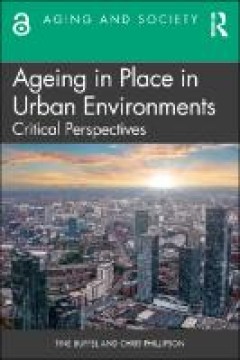
Ageing in Place in Urban Environments : Critical Perspectives
Ageing in Place in Urban Environments considers together two major trends influencing economic and social life: population ageing on the one side and urbanisation on the other. Both have been identified as dominant demographic trends of the twenty-first century. Cities are where the majority of people of all ages now live and where they will spend their old age. Nevertheless, cities are typical…
- Edition
- -
- ISBN/ISSN
- 9781032134666
- Collation
- 218
- Series Title
- Aging and Society
- Call Number
- -

Ageing as a Unique Experience: Interdisciplinary Approaches to Ageing and Lat…
Ageing is a diverse and multifaceted experience that is unique to each person. The process of ageing is lived differently according to each individual’s socio-cultural, historical, religious, and political context, among other factors. However, the stereotype of homogeneity is still one of the strongest aspects related to later life. This Special Issue covers manuscripts of original research …
- Edition
- -
- ISBN/ISSN
- 9783036566184
- Collation
- 224
- Series Title
- -
- Call Number
- -
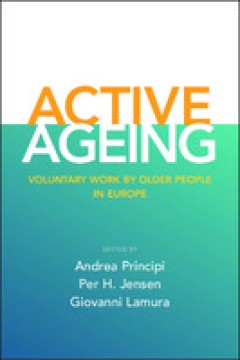
Active ageing
In this topical book older people's volunteering is studied in eight European countries at the structural, macro, meso and micro levels. Overall it highlights how different interactions between the levels facilitate or hinder older people's inclusion in voluntary work and makes policy suggestions for an integrated strategy.
- Edition
- -
- ISBN/ISSN
- 9781447354765
- Collation
- oer.unej.ac.id
- Series Title
- -
- Call Number
- -
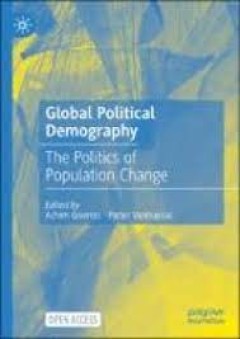
Global Political Demography The Politics of Population Change
This open access book draws the big picture of how population change interplays with politics across the world from 1990 to 2040. Leading social scientists from a wide range of disciplines discuss, for the first time, all major political and policy aspects of population change as they play out differently in each major world region: North and South America; Sub-Saharan Africa and the MENA regio…
- Edition
- -
- ISBN/ISSN
- 9783030730659
- Collation
- -
- Series Title
- -
- Call Number
- -

Digital Ageism How it Operates and Approaches to Tackling it
This anthology contributes to creating awareness on how digital ageism operates in relation to the widely spread symbolic representations of old and young age around digital technologies, the (lack of) representation of diverse older individuals in the design, development, and marketing of digital technologies and in the actual algorithms and datasets that constitute them. It also shows how ind…
- Edition
- -
- ISBN/ISSN
- 9781000904796
- Collation
- -
- Series Title
- -
- Call Number
- -
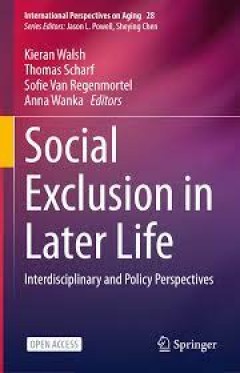
Social Exclusion in Later Life Interdisciplinary and Policy Perspectives
Drawing on interdisciplinary, cross-national perspectives, this open access book contributes to the development of a coherent scientific discourse on social exclusion of older people. The book considers five domains of exclusion (services; economic; social relations; civic and socio-cultural; and community and spatial domains), with three chapters dedicated to analysing different dimensions of …
- Edition
- -
- ISBN/ISSN
- 9783030514068
- Collation
- -
- Series Title
- -
- Call Number
- -

Nutrition, Exercise and Epigenetics: Ageing Interventions
This book focuses on the three most important aspects of ageing research: nutrition, physical exercise and epigenetics. The contributors discuss ways that age-related epigenetic imprints such as DNA methylation and histone acetylation are modified by these two interventions. The emphasis on epigenetics helps to illuminate the underlying mechanisms of anti-ageing interventions, as ageing and dis…
- Edition
- 1
- ISBN/ISSN
- 978-3-319-14829-8
- Collation
- VIII, 278
- Series Title
- Healthy Ageing and Longevity
- Call Number
- -

Integrating Emotions and Cognition Throughout the Lifespan
This book synthesizes the literature on emotional development and cognition across the lifespan. The book proposes a core language by which to describe positive and problematic developmental changes by recourse to a parsimonious set of core principles, such as elevations or declines in tension thresholds and their relation to the waxing and waning of the cognitive system over the life course. I…
- Edition
- -
- ISBN/ISSN
- 978-3-319-09822-7
- Collation
- -
- Series Title
- -
- Call Number
- -
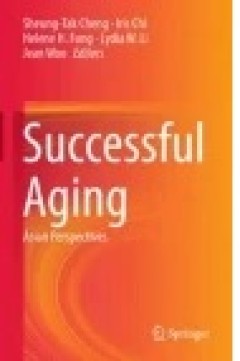
Successful Aging
This book brings together state-of-the-art research on successful aging in Asian populations and highlights how the factors that contribute to successful aging differ from those in the West. It examines the differences between the Asian and Western contexts in which the aging process unfolds, including cultural values, lifestyles, physical environments and family structures. In addition, it exa…
- Edition
- -
- ISBN/ISSN
- 978-94-017-9331-5
- Collation
- VI, 349
- Series Title
- -
- Call Number
- -

End-of-Life Care in Cardiovascular Disease
End-of-life issues in cardiology are becoming increasingly important in the management of patients in the cardiac unit, but there is frequently a lack of understanding regarding their impact on cardiology practice. The cardiac unit is increasingly becoming the location whereby a number of key clinical decisions relating to end-of-life care are being made, such as the decision to remove medicati…
- Edition
- -
- ISBN/ISSN
- 978-1-4471-6521-7
- Collation
- 8 b/w illustrations, 8 illustrations in colour
- Series Title
- -
- Call Number
- -
 Computer Science, Information & General Works
Computer Science, Information & General Works  Philosophy & Psychology
Philosophy & Psychology  Religion
Religion  Social Sciences
Social Sciences  Language
Language  Pure Science
Pure Science  Applied Sciences
Applied Sciences  Art & Recreation
Art & Recreation  Literature
Literature  History & Geography
History & Geography